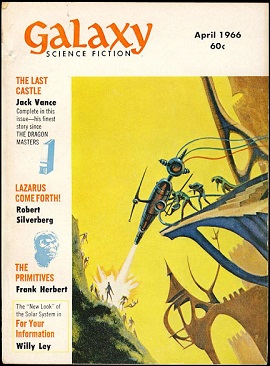Jack Vance quotes (nonfiction): Difference between revisions
(Created page with "Quotations and excerpts from the work of writer Jack Vance. == The Last Castle == === Xanten drives through the night === <blockquote> The gentl...") |
No edit summary |
||
| Line 4: | Line 4: | ||
=== Xanten drives through the night === | === Xanten drives through the night === | ||
[[File:Galaxy_-_April_1966.jpg|thumb|''Galaxy'', May 1966. The cover story is Vance's ''The Last Castle''.]] | |||
<blockquote> | <blockquote> | ||
The gentlefolk of the castles, for all their assurance, disliked to wander the countryside by night, by reason of what some derided as superstitious fear. Others cited travelers | The gentlefolk of the castles, for all their assurance, disliked to wander the countryside by night, by reason of what some derided as superstitious fear. Others cited travelers | ||
Revision as of 05:38, 14 May 2020
Quotations and excerpts from the work of writer Jack Vance.
The Last Castle
Xanten drives through the night
The gentlefolk of the castles, for all their assurance, disliked to wander the countryside by night, by reason of what some derided as superstitious fear. Others cited travelers benighted beside mouldering ruins and their subsequent visions: the eldritch music they had heard, or the whimper of moon-mirkins, or the far horns of spectral huntsmen. Others had seen pale lavender and green lights, and wraiths which ran with long strides through the forest; and Hode Abbey, now a dank tumble, was notorious for the White Hag and the alarming toll she exacted.A hundred such cases were known. While the hard-headed scoffed, none needlessly traveled the countryside by night. Indeed, if truly ghosts haunt the scenes of tragedy and heartbreak, then the landscape of Old Earth must be home to ghosts and specters beyond all numbering; especially that region across which Xanten rolled to the power-wagon, where every rock, every meadow, every vale and swale was crusted thick with human experience.The moon rose high. The wagon trundled north along an ancient road, the cracked concrete slabs shining pale in the moonlight. Twice Xanten saw flickering orange lights off to the side, and once, standing in the shade of a cypress tree, he thought to see a tall quiet shape, silently watching him pass.
Philidor and Xanten
Philidor nodded. "I know that the history of man is not his technical triumphs, his kills, his victories. It is a composite, a mosaic of a trillion pieces, the account of each man's accomodation with his conscience. This is the true history of the race."
Xanten made an airy gesture. "A.G. Philidor, you oversimplify grievously. Do you consider me obtuse? There are many kinds of history. They interact. You emphasize morality. But the ultimate basis of morality is survival. What promotes survival is good; what induces mortifaction is bad."
"Well spoken!" declared Philidor. "But let me propound a parable. May a nation of a million beings destroy a creature who otherwise will infect all with a fatal disease? Yes, you will say. Once more: ten starving beasts hunt you, that they may eat. Will you kill them to save your life? Yes, you will say again, though here you destroy more than you save. Once more: a man inhabits a hut in a lonely valley. A hundred spaceships descend from the sky, and attempt to destroy him. May he destroy these ships in self-defense, even though he is one and they are a hundred thousand? Perhaps you will say yes. What, then, if a whole world, a whole race of beings, pits itself against this single man. May he kill them all? What if the attackers are as human as himself? What if he were the creature of the first instance, who otherwise will infect an entire world with disease? You see, there is no instance where a simple touchstone avails. We have searched and found none. Hence, at the risk of sinning against Survival, we — I, at least; I can only speak for myself — have chosen a morality which at least allows me calm. I kill — nothing. I destroy — nothing."
"Bah," said Xanten contemptuously. If a Mek platoon entered this valley and began to kill your children, would you not defend them?"
Philidor compressed his lips, turned away. Another man spoke. "Philidor has defined morality. But who is absolutely moral? Philidor, or I, or you, might desert his morality in such a case."
In the News
Fiction cross-reference
Nonfiction cross-reference
External links
- Jack Vance @ Wikipedia
